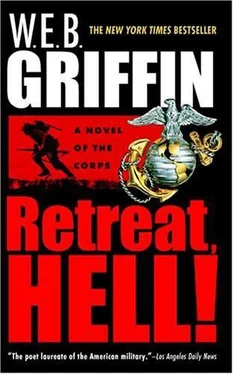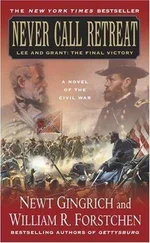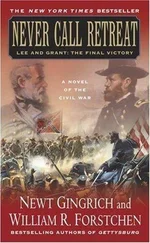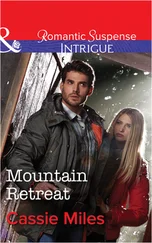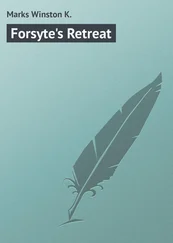"He's the officer the Pentagon sent to see if General Dean could be rescued," Major General Ralph Howe said. "I suggested that he be transferred to the CIA to keep him out of Willoughby's hands."
"I remember now. It says here he's the Seoul station chief," Truman said.
"After I got your message about him, Mr. President," Walter Bedell Smith said, "I told General Bradley that was your desire. He placed him on indefinite duty with the CIA, and I so notified General Pickering. I can only suppose General Pickering designated him as Seoul station chief."
"Good man?"
"General Bradley thought he was the best man for that job," Smith said. "I mean, trying to get General Dean back."
"Ralph?"
"First-class man, Mr. President. I understand why he and the Killer get along so well."
"So well that he'd going along with ... I'm not going to call that young man 'Killer' . . . McCoy because they're pals?"
"No, sir," Howe said firmly. "He would not."
"Vandenburg's the fellow who stole General Walker's airplane, right?"
"Mr. President, I said nothing of the kind," Howe said, smiling. "But I admit that he's probably justifiably high on the list of suspects."
"Huh," the President snorted. "Well, you say he's a good man, and he goes along with McCoy all the way. Where does that leave us?"
"I think there is no longer any question that there are substantial numbers of Red Chinese in Korea, Mr. President," Howe said.
"I never really doubted that. What about this business about the Chinese sending us a message?"
"I don't know, sir. I'd bet on McCoy."
"Okay. Let's take that as a given. So what do we do about it?"
"First thing this morning, Mr. President," Smith said, "I checked with the Pentagon. There was nothing in the overnight messages from the Dai Ichi Building suggesting that the Supreme Command has changed its mind about the Red Chinese coming in."
"That makes things difficult, doesn't it?" Truman said. "I find myself in the position of agreeing with a major—and a lieutenant colonel—and disagreeing with a five-star general who Ralph, General Pickering, and ninety percent of the American people think is a military genius."
"Mr. President, may I make a suggestion?"
"I'm wide open for suggestions."
"You could have the Army urgent-message General MacArthur saying they have intelligence suggesting there has been a substantial movement of ChiCom forces to the border and probably across it. And what does General MacArthur think?"
"Why not just send him a message saying the CIA has interrogated four senior Chinese Communist officers?" Truman asked. Then he added: "Don't bother to answer that. I can't do that, because they know who the CIA people there are, and we're right back to me telling a five-star military genius he's wrong."
"I think Beetle's idea is a good one, Mr. President," General Howe said.
Truman looked directly at him for perhaps thirty seconds.
"Okay," he said finally. "That's what we'll do. But I want you to write the message, Ralph."
"Why me, Mr. President?"
"Because, of the three of us, you're the only one who really knows Emperor Douglas the First. I don't think we had an hour together on Wake Island. And God only knows what kind of a message he'd get from the Pentagon if Smith just told them I wanted a message sent. Either it would be mostly an apology for questioning his genius, or it would be designed to get a response they know would make me mad. What I want him to do when he gets the message is personally think it over, and not just buck it down to General Willoughby. You know how to phrase it to make him do that."
"Okay. Good thinking," Howe said thoughtfully.
"And when you two have finished writing it, I want you, Smith, to take it to the Pentagon, give it to General Bradley, and tell him I want it sent as-is and right now."
"He's not going to like that, Harry . . . Mr. President," Howe said.
"He doesn't have to like it. I'm not sure about some of the others, but I am absolutely sure General Bradley knows who is Commander-in-Chief," Truman said.
"Will there be anything else, Mr. President?" Howe asked.
"Yes," the President said. "Get me the names of those Marines who are missing, the 'stay-behinds' who got caught. When this is over, I want to write their families."
"That's very generous of you, Mr. President—" Smith began.
" 'Generous' is not the word," Truman interrupted him.
"I was about to say, sir, it is generous of you to find the time."
"Abraham Lincoln did it when he was living across the street," Truman said. "And as bad as things are, things were worse for him when he did it."
"Yes, sir," Smith said.
"I'll get the names and addresses of the next of kin, Mr. President," Smith said.
"And that reminds me," the President said. "What about the Navy Cross for Pickering's son?"
"The commandant assures me, Mr. President, that the decoration will be awarded within the next forty-eight hours. And he told me that yesterday. He may have it already."
"Okay. Thank you."
[TWO]
8O23d Transportation Company (Depot, Forward)
Hamhung, North Korea
1Z3S 2 November 195O
The maps Captain Francis P. MacNamara had obtained from the X Corps Engineer—not without difficulty; maps were in short supply—showed that it was approximately sixty miles by highway from Wonsan to Hamhung, and a few miles farther, no highway, to Hungnam, which was on the Sea of Japan.
The problem was that this was Korea, where a highway was any two-lane paved road, and the definition of "paved" was loose. It often meant that it was paved with a thin layer of gravel. Furthermore, the road—there was only one "highway"—had not been built to withstand the traffic now moving up it, in terms of either weight or numbers.
The United States X Corps was on the move. The order had been issued to advance to the Chinese border. That meant not only the American 7th Infantry Division and 1st Marine Division, and the four ROK Divisions, which were "up front," but the mind-boggling support and logistical train needed to support it.
It wasn't simply a question of supplying the attacking divisions with food, fuel, and ammunition, or even also moving their supporting tactical units, the separate tank and artillery battalions, and so on—and their food, fuel, and ammunition—but the nonfighting units had also been ordered moved out of Wonsan. These ranged from Mobile Army Surgical Hospitals to Quartermaster Ration Depots, Ordnance Ammunition Supply Points, down to smaller units such as Water Purification Platoons, Shower Points, and a Mobile Dental Surgical Detachment.
Into this mix, all trying to move up the same winding, crumbling, narrow two-lane "highway," Colonel T. Howard Kennedy, the X Corps Transportation Officer, had added Captain MacNamara's 8023d Transportation Company (Depot, Forward) and the Replacement Company of the 7th United States Infantry Division.
It was worse than anything MacNamara had seen in France in World War II, and when he first got into the line of moving vehicles, he had used his experience in France to predict that it would take six hours to move the sixty miles. It took eighteen.
Not all of that time—in fact very little—was spent on the move. Most of it was spent stopped, as units, or individual vehicles, with a higher priority passed them on the left lane. The basic rule of thumb was that medical supplies went first, then ammunition, then food.
Overworked, and thus sometimes snarling, military policemen guided high-priority convoys onto the left lane, past stopped convoys with lesser priorities.
The first military police officer Captain MacNamara encountered had asked him for his movement priority, which would then be painted on the lead vehicle for the edification of military police along the route.
Читать дальше
